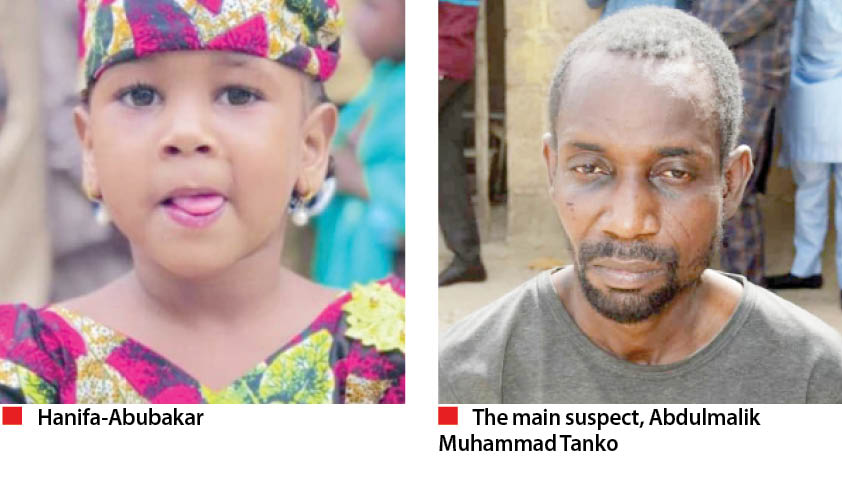Until the Legal Aid Council of Nigeria decided to step in to defend Abdulmalik Tanko and his co-defendants, accused of the kidnap and murder of five-year-old Hanifa Abubakar, lack of legal representation had been a clog in the wheel of fair trial and justice dispensation in the case, Daily Trust reports.
On Thursday, Kano State Attorney General and Commissioner for Justice, Barrister Musa Abdullahi Lawan, had revealed that the Legal Aid Council of Nigeria has indicated an intention to provide legal representation for Abdulmalik Tanko and his co-defendants in the murder case as a sequel to the order made by Justice Usman Na’abba of Kano State High Court on Feb. 5 that the state should provide counsel for Tanko and two other defendants sequel to their prayer, seeking to have a legal representation.
Public perception of the role of defence lawyers in high profile criminal cases, especially such with public outcry, has always been a major bane in getting lawyers to help fulfil the constitutional role of a fair trial, several lawyers have admitted.
When the case of the gruesome murder of young Hanifa reportedly by her school proprietor, Tanko, became public knowledge, the outrage in the public space metamorphosed into a call for public execution of the suspect to serve as a deterrent to others and at least bring immediate succour to her grieving family and the populace.
But despite the self-confession of the proprietor, who gave lurid details of how he snuffed life out of the little girl, the legal principle of “presumption of innocence”, which means that every person accused of any crime is considered innocent until proven guilty, makes it imperative that public outcry is not enough to convict and punish a person but the process of fair trial must and should not be circumvented.
For a fair trial to be assumed to have taken place, at least legal representation for the accused person is non-negotiable especially in capital offences, several judgements of the Supreme Court have established, lawyers said.
And like the case of Tanko, very recently, two convictions of blasphemy by a Sharia Court in Kano were overturned at appeal for lack of fair trial in that the accused persons were not represented at the trial court.
But despite the knowledge of this position of the law, several lawyers have continued to shy away from being involved in cases that have generated public outrage for the fear of being labelled a conspirator by the public.
A senior advocate of Nigeria (SAN), Olalekan Ojo, who entered an appeal for the infamous Chukwuemeka Ezeugo (Reverend King), who was convicted and sentenced to death for killing his church member in 2006, shared his thoughts on the role of lawyers in crimes considered heinous with public outrage.
“It is unethical for lawyers to refuse to defend any person accused of having committed a criminal offence whether or not it carries capital punishment on the ground of what the public may think, on the ground of sentiment.
“It is for the defence counsel to plead before the court whatever defence is available to the accused person,” he said.
The ethics of the profession, according to Ojo and several other lawyers spoken to, does not permit the lawyer to say because a particular crime is heinous or that the public may not like it (for the accused to be defended), therefore a lawyer will refuse to accept the duty.
“There are situations where you even see some members of the public cursing some lawyers via social media because the lawyers have decided to defend some persons that are believed to have committed heinous crime, but it is not what the ethics of the profession teaches us (to refuse to defend an accused on this basis),” Ojo added.
The senior lawyer recalled a case they were taught with in the law school which he said happened in the 1960s.
“A lawyer was being driven to court and his driver hit a passerby and the lawyer decided to render assistance to the victim but a mob descended on the lawyer and killed him. When those arrested in connection to killing were charged to court, lawyers refused to defend any of them. The then Chief Justice of Nigeria condemned the act of the lawyers in refusing to defend those charged with an offence of killing the lawyer,” he recalled.
He explained that the duty of a defence lawyer is to fulfil the constitutional prescription that the accused person must have a defence.
He said there must be constant appeal and sensitization of the public for them to know that when any lawyer chose to defend such persons, the lawyer is doing his legal duty of ensuring that the accused person has a fair trial and does not mean that the lawyer’s presence means the person must not be convicted.
On whether the Nigerian Bar Association (NBA) could have presented the accused person with legal services on pro bono, Ojo said unless the public is well educated, they may have a wrong perception of the NBA in doing this.
“There is nothing ethically wrong in the pro-bono committee of the NBA, either at the branch or national level doing such a thing, but public perception in Nigeria is a very serious matter. Most people see any lawyer defending him (Tanko) as if he approves of what he did and that is not so.”
On whether a lawyer can suffer backlash for defending persons already pronounced guilty by the public, he said “We have had cases where you discover that some persons of the public may not like you, but a lawyer should know he is carrying out a professional duty. As such, he must not get bothered on what the public may say on what he is doing.”
Buttressing Ojo’s position, Barrister Aminu Gadanya, the chairman of the NBA Kano chapter, said there is more that has to be done to properly sensitize and educate the public on the role of a lawyer to help change some of the negative perceptions.
“At every opportunity we have, we always enlighten the public, and also lawyers that it is not the responsibility of a lawyer to manufacture facts but to present the facts the way they are. Like this case of Hanifa, it is just to present the facts as they are. Lawyers are not liars,” he said.

 Join Daily Trust WhatsApp Community For Quick Access To News and Happenings Around You.
Join Daily Trust WhatsApp Community For Quick Access To News and Happenings Around You.


